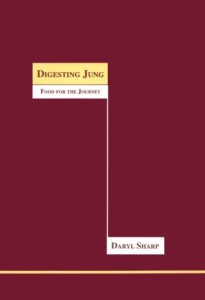Digesting Jung – by Daryl Sharp (book review)
Tasha Tollman reviews Digesting Jung
Call it coincidence, synchronicity, destiny, fate – in one moment my life collided with the work of Carl Gustav Jung and changed forever. At that moment I became a stranger travelling in some exotic land where the natives spoke a peculiar language using words like “persona”, “shadow”, “anima/animus”, “typology”, “projection”, “complexes”, “archetypes” and “individuation” – words that resonated deep inside of me and called me to a journey of self-development and individuation.
Searching for a translator, I came across Digesting Jung. In the preface, Daryl Sharp writes “this particular book evolved out of a desire to pinpoint key passages in Jung’s writing that have nourished me for many years. It provides readers new to analytical psychology with the main ingredients of Jung’s work and how they might flavor a life.” (p.7). In the book, Sharp covers complexes, archetypes, instincts, the four typology functions, the persona, the shadow, anima/animus, the Self, dreams, projection, neurosis, the analytical process and the way of individuation.
Each chapter begins with an extract from Jung’s writings which Sharp then fleshes out – explaining, expanding and illuminating each idea. The brilliance of Sharp lies in his capacity to distill the complex concepts and ideas of Jung so that they become truly accessible and this makes this book invaluable for the reader new to analytical psychology.
The true value of this book and the rare genius of Sharp becomes apparent as Sharp moves the reader beyond the mere realm of thinking into a heuristic journey of self discovery, as he says “True healing does not happen in the head. It occurs through feeling-toned realizations in response to lived experience …. Thoughts ‘in the form of an experience’ have a transforming effect because they are numinous, overwhelming. They lead to a more balanced perspective: one is merely human – not entirely good (positive inflation) not entirely bad (negative inflation) but a homogenous amalgam of good and evil. The realization and acceptance of this is a mark of the integrated personality.” (p.60).
Digesting Jung, is illuminating, thought provoking and “stimulates the reader to ruminate on what is happening in his or her own life and the unconscious factors that for good or ill influence the lives of each of us.” The book is full of provoking questions, encouraging you to discover and become aware of the way in which you function, to assess your attitudes and behavior in a given situation and adjust them accordingly…in this situation, with that person, how did I function and with what effect? Did my actions truly reflect my judgements (thinking and feeling) and perceptions (sensations and intuition)? And if not, why not? What complexes were activated in me? To what end? What does this say about my psychology? What can I do about it? What do I want to do about it?” (p.20) As Sharp says “Jungian analysis is not about improving yourself or making you a better person. It is about become conscious of who you are, including your strengths and weaknesses” (p.58) so that “the truth of yesterday … be set aside for what is now the truth of one’s psychic life” Marie-Louise van Franz, Redemption Motifs in Fairy tales, p.85).
This book has nourished, stimulated and provided flavor to my life for many years – orientating me when I’ve become overwhelmed with the complexity of Jung’s concepts and ideas; prompting me with questions to move from conceptual thinking to practical application so that I could become aware of my moods, fantasies, impulses and conscious of my shadow, projections and complexes; helping me to assess my attitudes and behaviours; moving me towards greater self-knowledge and a more conscious attitude. In my opinion, it’s a must read for everyone new to analytical psychology and for those readers seeking an experiential, heuristic journey into the work of Jung.
Whilst the book is a brilliant, easy to understand introduction to Jung’s work, it fails (as one might expect) to fully reflect the richness and depth of his concepts and ideas; and so paradoxically, runs the risk of making Jung’s work too simplistic and too accessible and as Sharp himself says “those seeking a more robust meal will be amply rewarded by following up the footnote references” (p.7) or simply reading one of his other books.
Interested? Download the book for FREE from Inner City Books, www.innercitybooks.net/freedownloads.html.
Other free titles available on this site:
Chicken Little : The Inside Story
CG Jung Lexicon : A Primer of Terms and Concepts
Personality Types : Jung’s Model of Typology
Live your Nonsense : Halfway to Dawn with Eros
Not the Big Sleep : On Having Fun, Seriously
Tasha Tollman is a NLP & ETDP Practioner who spends her days as a journalist, trainer and coach, the rest of her time is devoted to Applied Jungian and counseling studies, as she adventures through life questioning, imagining and connecting


Leave a Reply